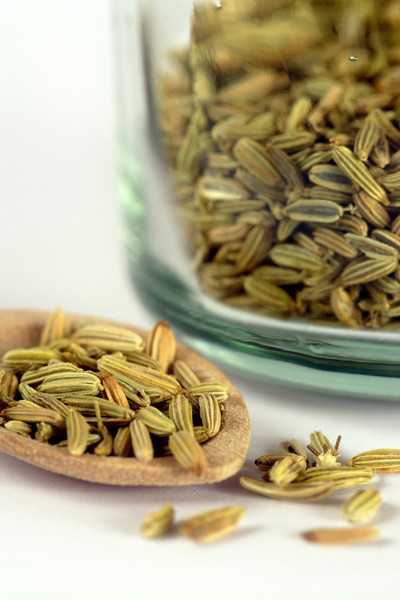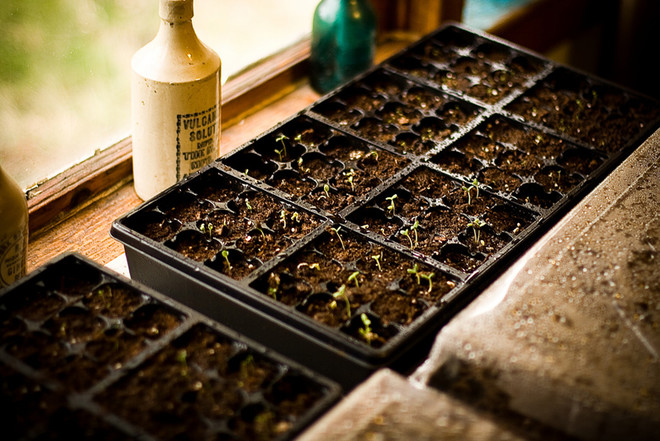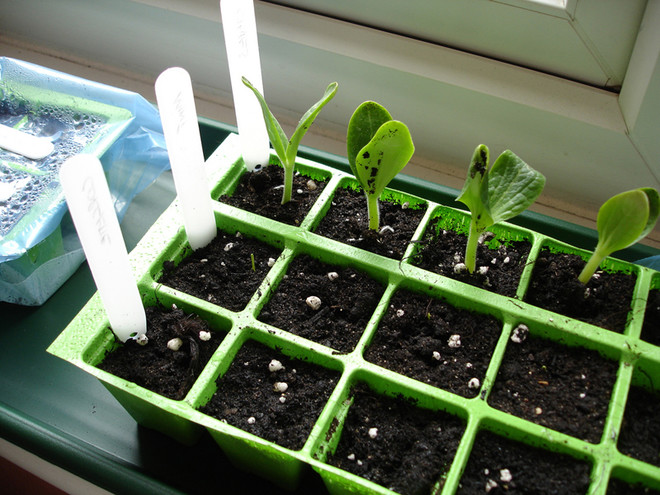 1.Before you go out to buy seeds, check your last year's supplies. You probably have a lot of seeds left over from last spring. Find the expiration dates on the packaging and try to remember when you bought the seeds. If they were a long time ago, it's best to throw them away. Otherwise, in May you'll be left not only without seeds, but also without seedlings. Also, keep in mind that the expiration date applies to a sealed product, and if you didn't use all the seeds from the bag last time, it's better to sow them in double quantity now. Parsnips, black onions, asters, and delphiniums lose their germination capacity faster than others. Tomatoes, cabbage, and pumpkins show only a slight decrease in seed "activity." The general rule is that the smaller the seeds, the longer they retain their original germination capacity. 2. Make a list of the necessary seeds. Be sure to include the types and varieties. This list will help you navigate in a garden store and "stay on course". After all, very often, faced with a huge selection in a shopping center, we get lost and buy not what we intended, but what random people or a seller advised. 3. Do not buy seeds for future use. It is unknown what quality they will be in a year. Seeds that are lying around at home lose their germination much faster than those stored in the warehouse of the manufacturer. Another argument "against" stocks - 2013; selection does not stand still: next year some extraordinary variety may appear, so the one bought today will not be comparable to it.
1.Before you go out to buy seeds, check your last year's supplies. You probably have a lot of seeds left over from last spring. Find the expiration dates on the packaging and try to remember when you bought the seeds. If they were a long time ago, it's best to throw them away. Otherwise, in May you'll be left not only without seeds, but also without seedlings. Also, keep in mind that the expiration date applies to a sealed product, and if you didn't use all the seeds from the bag last time, it's better to sow them in double quantity now. Parsnips, black onions, asters, and delphiniums lose their germination capacity faster than others. Tomatoes, cabbage, and pumpkins show only a slight decrease in seed "activity." The general rule is that the smaller the seeds, the longer they retain their original germination capacity. 2. Make a list of the necessary seeds. Be sure to include the types and varieties. This list will help you navigate in a garden store and "stay on course". After all, very often, faced with a huge selection in a shopping center, we get lost and buy not what we intended, but what random people or a seller advised. 3. Do not buy seeds for future use. It is unknown what quality they will be in a year. Seeds that are lying around at home lose their germination much faster than those stored in the warehouse of the manufacturer. Another argument "against" stocks - 2013; selection does not stand still: next year some extraordinary variety may appear, so the one bought today will not be comparable to it. 4.It is best to buy seeds in a specialized store. Seeds are now sold anywhere, from markets to regular supermarkets. But who will guarantee that the seeds were stored correctly and, accordingly, will sprout? So it is best to do this in specialized centers. In addition, there you can always get qualified advice and be sure of the quality of the goods (companies "Semko", "Agrotech", "Sedek", "Elkom Semena", etc.). 5. Pay attention to the expiration date of the seeds. The marking of imported and domestic seeds is different. On "our" bags, the expiration date is often indicated. That is, until the specified date, the seeds will still be "alive", but their germination may decrease. On imported packages, the validity period of the germination analysis is usually indicated. However, if this period has expired, the seeds are still quite viable, but their germination rate (which no one guarantees) has most likely decreased. Keep this fact in mind when buying. Carefully examine the marking: the expiration date is not stamped on the bag, but printed - this is a fake: it means that the bags are printed in large quantities for several years in advance. The safety of the seeds also depends on the type of packaging. Those protected by foil are stored a little longer. But once you open such a bag - all protective properties are lost. Expiration dates of vegetable seeds
4.It is best to buy seeds in a specialized store. Seeds are now sold anywhere, from markets to regular supermarkets. But who will guarantee that the seeds were stored correctly and, accordingly, will sprout? So it is best to do this in specialized centers. In addition, there you can always get qualified advice and be sure of the quality of the goods (companies "Semko", "Agrotech", "Sedek", "Elkom Semena", etc.). 5. Pay attention to the expiration date of the seeds. The marking of imported and domestic seeds is different. On "our" bags, the expiration date is often indicated. That is, until the specified date, the seeds will still be "alive", but their germination may decrease. On imported packages, the validity period of the germination analysis is usually indicated. However, if this period has expired, the seeds are still quite viable, but their germination rate (which no one guarantees) has most likely decreased. Keep this fact in mind when buying. Carefully examine the marking: the expiration date is not stamped on the bag, but printed - this is a fake: it means that the bags are printed in large quantities for several years in advance. The safety of the seeds also depends on the type of packaging. Those protected by foil are stored a little longer. But once you open such a bag - all protective properties are lost. Expiration dates of vegetable seeds
- Peas – 5-6 years
- Zucchini, squash – 5-8 years
- Cabbage – 4-5 years
- Onion – 2-3 years
- Carrots – 2-3 years
- Cucumber – 5-7 years
- Greens (parsnips, parsley, dill, celery) – 2-3 years
- Radish, horseradish, turnip – 4-5 years
- Salad – 3-4 years
- Beetroot – 5-7 years
- Tomato – 5-7 years
- Pumpkin – 5-8 years
- Spinach – 3-5 years
6. Carefully inspect the packaging.The package must necessarily indicate the full address and telephone number of the manufacturer, the name of the crop, variety, hybrid designation "F1", standard (TU) for varietal and sowing qualities, batch number, weight in grams or number of pieces. If the batch number and expiration date of the seeds are printed in a printing house - this is a 100% guarantee of fraud. It is impossible to predict in advance when exactly the packaging will take place and what batch of seeds will end up in these bags. 7. Do not chase exoticism. In order to intrigue the buyer, very often scammers come up with more exotic varieties: for example, "Red Antillean cucumber", currant tree, tomatoes "Mammoth". When buying into these names, do not be surprised if the result is far from the colorful picture on the package or these "exotic" the plants simply won't sprout. When is the best time to buy seeds? If in the summer you were pleasantly surprised by the harvest obtained from the seeds bought in the spring, it is worth buying more in the fall: it is quite possible that you will be able to buy seeds from the same batch and of the same quality (just don't forget about the expiration dates!). And if you are not satisfied with the result, postpone the purchase until February, when the seeds of the new harvest appear. 8. Buy seeds from well-known companies that have proven themselves from the best side. If you are still a beginner in this business, listen to the advice of your summer cottage neighbors or relatives. They will be happy to share their own experience, as well as their gardening achievements. 9. Prefer regular varieties to hybrids.Hybrids are obtained by crossing plants of different varieties. Their production is not cheap, so they are always more expensive than varieties. Hybrids are more productive and of higher quality, but they retain their properties only in the first generation (marked on the packaging as – «F1»). When buying cucumber, tomato or pepper seeds, choosing hybrids is justified: they are much more resistant to diseases and adverse conditions. But as for the seeds of other crops, hybrids are often just an imported version with improved industrial qualities: for example, their fruits are the same size or they are convenient for mechanical harvesting. When buying a hybrid variety, inquire how it differs from a regular one, and analyze whether you really need these qualities. At the same time, keep in mind that seeds from hybrids cannot be collected. They will not only not repeat the original qualities, but will be significantly worse than the parent pairs. How to store? Seeds should be stored in a cool, but not humid place at + 10-12 ºC. Many cannot stand sub-zero temperatures. 10. At home, write the date of purchase on each packet. Over time, add the sowing date here. Do not throw away the packet - you can use it to select the same variety from the same batch or make a claim to the manufacturer. Seeds - by mail
9. Prefer regular varieties to hybrids.Hybrids are obtained by crossing plants of different varieties. Their production is not cheap, so they are always more expensive than varieties. Hybrids are more productive and of higher quality, but they retain their properties only in the first generation (marked on the packaging as – «F1»). When buying cucumber, tomato or pepper seeds, choosing hybrids is justified: they are much more resistant to diseases and adverse conditions. But as for the seeds of other crops, hybrids are often just an imported version with improved industrial qualities: for example, their fruits are the same size or they are convenient for mechanical harvesting. When buying a hybrid variety, inquire how it differs from a regular one, and analyze whether you really need these qualities. At the same time, keep in mind that seeds from hybrids cannot be collected. They will not only not repeat the original qualities, but will be significantly worse than the parent pairs. How to store? Seeds should be stored in a cool, but not humid place at + 10-12 ºC. Many cannot stand sub-zero temperatures. 10. At home, write the date of purchase on each packet. Over time, add the sowing date here. Do not throw away the packet - you can use it to select the same variety from the same batch or make a claim to the manufacturer. Seeds - by mail
- Seeds - Plants - Seedlings
- Your garden
- Inter-Bio
- Flower seeds
- Wholesale seeds
- Garden World
In preparing this article, materials from the magazine "Gardener" and kp.ru were used.









